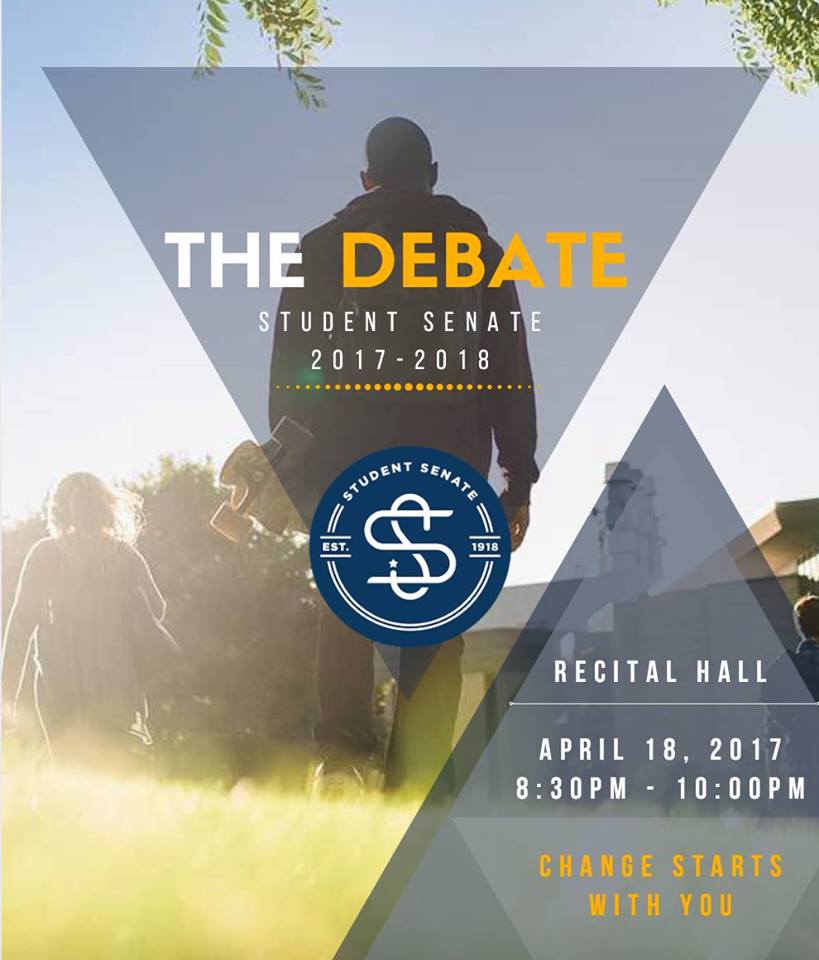Students gathered in the Recital Hall on Wednesday for the 86th annual student senate debate. Juniors Andrew Oppong and Billy Fredericks are facing off for president while the four students running for vice president and the seven running for senate spots are running uncontested.
“Every student that’s running still needs to get 500 votes” via the online voting process, said Bill Warners, the current student body president who ran uncontested last year.
He argues that voting matters: “The administration views that as the way students participate,” he said. “They want to know what students are thinking.”
After each candidate gave opening statements, moderated by the crowd-pleasing senator Reitsma Mpindi, each candidate group answered questions given by a current senate member.
Oppong and Fredericks both emphasized a desire to enable all student voices to be heard—and shared a love of lunch dates with political science professor Becca McBride. However, they approached this in slightly different ways.
Fredericks emphasized a desire to make Calvin welcoming to all students—from those who don’t feel at home here, to vulnerable groups to prison students, to those whose majors have been cut.
Oppong emphasized a desire to enable students to use the “powerful voice” they might not know they have — highlighting the necessity of student-faculty relationships in accomplishing senate goals.
Next year’s administration will stick with the constitutional amendment which allowed for four vice presidents after president Ethan DeVries and executive vice president Andrew Darmawan stepped down last year. Warners thinks this structure works well. However, he said, they are changing the structure a bit for next year by incorporating internal committees.
Warners was happy with how the debate went. “Last year it was hard for us as candidates, so we were equipped to come in and make a better one,” he said. “We talked about issues students really care about.”
A desire to promote diversity and the voices of all students were common themes throughout each debate.
VP candidate Matthew Seafield hopes to promote diversity and inclusion given the outside political climate and wants to continue to work to make the faculty more diverse. VP candidate Laura Harjanto, too, emphasized the importance of the “R.A.C.E.” forum this year, which resulted in six demands for a more diverse faculty. She would work to ensure faculty listen to these demands.
Candidates also talked about transparency for both student senate and faculty throughout the night.
Fredericks said rumors, like a recent one which said the new signs cost 1.3 million dollars, shouldn’t spread and students should be connected with facts. Oppong said he wants to be transparent and let students know what’s happening on the ground.
VP candidate Hallie Litt hopes to improve the transparency between senate and the student body and faculty, as well as transparency between cabinet members and senators. Harjanto hopes to improve senate transparency by posting minutes and the budget to the senate website.
Candidates also described what programs they would support and work for as senate members.
Oppong would emphasize Cookie Thursdays and Take your Prof Out to Lunch in order to promote relationships, work to create study space for students and advocate for an open library each Sunday. He also hopes to broaden the view of “minority” to include not just ethnic minorities but LGBT+ students, those with disabilities and commuters.
As VP of administration this year, Fredericks explained he worked on a senate project advocating for an increase in diverse Calvin faculty. As president, he said, he would work to eliminate hiring practices which would impede diversity and advocate for accessible ways to let students know why tuition is increasing.
VP candidate Kieran Valk wants to implement short videos instead of emails to inform the student body, Litt wants to advertise the airport shuttle program more widely, Harjanto wants to give students a better picture of what senate does and Seafield wants to search for ways to expand and amend the core curriculum, as well as implement an all-day meal exchange in Johnny’s — a proposal the crowd seemed especially eager for.
The senatorial candidates’ goals included Tobe Nikida’s goal to encourage international and non-international students to interact, Arie Williams’ goal to use her computer science skills to perhaps make an app for students and Jonnelle Carr’s goal to encourage Calvin to reach out to potential students in the Caribbean.
Although Warners commended the candidates on speaking well about “stuff they see happening in one year,” he said. “We have yet to hear good ideas about how to do something five years from now, ten years from now.”
However, he said, “the administration is having these conversations. I’ve been in meetings talking about what commons looks like ten years from now and what the library looks like in 2025. Those are decisions that need student input, so you need to be advocates of the future as well.”
He explained that last year, his administration learned a lot through research and through talking to faculty. “That’s something I encourage the candidates to still do, is to keep doing research on what position they want and why and how it fits into Calvin in general.”
Junior Jen-Lyn Sin was happy with how both presidential candidates articulated their positions. “I know who I’m voting for,” she said. “But if the vote doesn’t go my way, I know the president will still do well.”
While senate candidates seem to bring up many of these goals—informing students of senate’s role, increasing diversity, opening the library on Sundays—each and every year, Warners said he remains optimistic. “Every year in the past student senate said ‘we’re going to get the library open on Sundays’ and it was our administration that finally did it,” for Sundays during exams.
“There’s not really an issue you can count student senate out on,” he said. “This just might be the year.”









